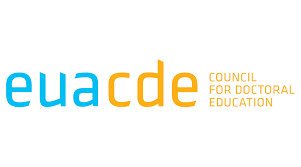08
25
2022
 Time and timing in doctoral education: Thoughts from the 2022 EUA-CDE Annual Meeting
Time and timing in doctoral education: Thoughts from the 2022 EUA-CDE Annual Meeting
The 15th Annual Meeting of the Council for Doctoral Education of the European University Association (EUA-CDE) was held at Manchester last June. This conference addressed the question of time and timing in the thesis, and took a close look at this key issue for doctoral education. The CUSO team had the chance to attend this Annual Meeting and we would like to take the opportunity to share with you some thoughts we took back with us.
- The length of doctoral studies is one of the most hotly debated issues in doctoral education. Currently, the average duration of a doctorate is around 3-4 years in full-time equivalents which is in line with the Salzburg Principles, but in many cases the total time taken to achieve it is significantly more. Though completion times have been slightly improved, a mismatch between expected and actual completion time still remains around the globe: Australia 3.5 years versus 4.8 years, South Africa 3 versus 5, USA 4 versus 6, Netherlands 4 versus 5.
- In the academic world, projectification means that research processes such as doctoral research are increasingly understood as the development, assessment, and realization of a project. It is generally expected that the realities of research should be designed on a bespoke plan, and follow this plan which is often not always the case when doing research. Thus, conflicts persist between the time available to make research, the uncertainty of the scientific process, the pressure to finish on time and to produce a thesis of an acceptable quality, and the duration of the funding. Adapting the projects duration to the reality would allow to maintain temporal flexibility in organizational and funding frameworks in order to relieve the pressure and increase the mutual understanding and consequentially the well-being of both the PhD candidates and their professors. It is essential that the policy decisions should be revisited to adapt the fundings based on realistic assumptions of how long it takes to complete a doctorate.
- Apart from funding, different factors may influence the completion time of a thesis: duration of a research cycle, work or family responsibilities, institutional factors (e.g. departmental research environment or equipment availability), the nature of the project itself (too large, too risky), and some personal factors (e.g. PhD candidate’s age, motivation, discipline, perseverance, self-confidence, willingness to work hard…). Another essential factor that influences the chances to complete on time is the nature and the quality of supervision. It is essential to find a good balance between the PhD candidate who has to work “autonomously” and the supervisor who is there to “support and guide”. This subtle balance can be achieved when there is a good dialogue between the PhD candidate and the supervisor which allow to reduce ambiguities and tacit expectations and to better deal with uncertainties.
- As professionals in doctoral education, we can support PhD candidates and supervisors in achieving a timely completion by activating “external” resources (e.g. thesis committee) or the support mechanisms that exists within universities. We may also help them with the PhD process and the ease of navigating within the academic and the administrative procedures (e.g. Welcome Package, introduction course about PhD life) or by setting up PhD networks. Offering training in transferable skills is crucial, and should be a priority for doctoral schools and programs. At the beginning of their doctorate, PhD candidates should first choose transferable skills courses related to the direct needs of their thesis (e.g. Academic Writing, Project Management, Time Management) whereas at the end of their thesis they should probably be more interested in all the courses linked to their career planning and the dissemination of their research. Identifying missing elements of skills training programs remains an important task for us.
This congress allowed for enriching exchanges and meetings and CUSO would like to thank the EUA-CDE for creating such opportunities.
More informations about this Annual Meeting on the website.
Mots clés: Beginning of thesis, Middle of thesis, End of thesis, CUSO, PhD




 Version française
Version française